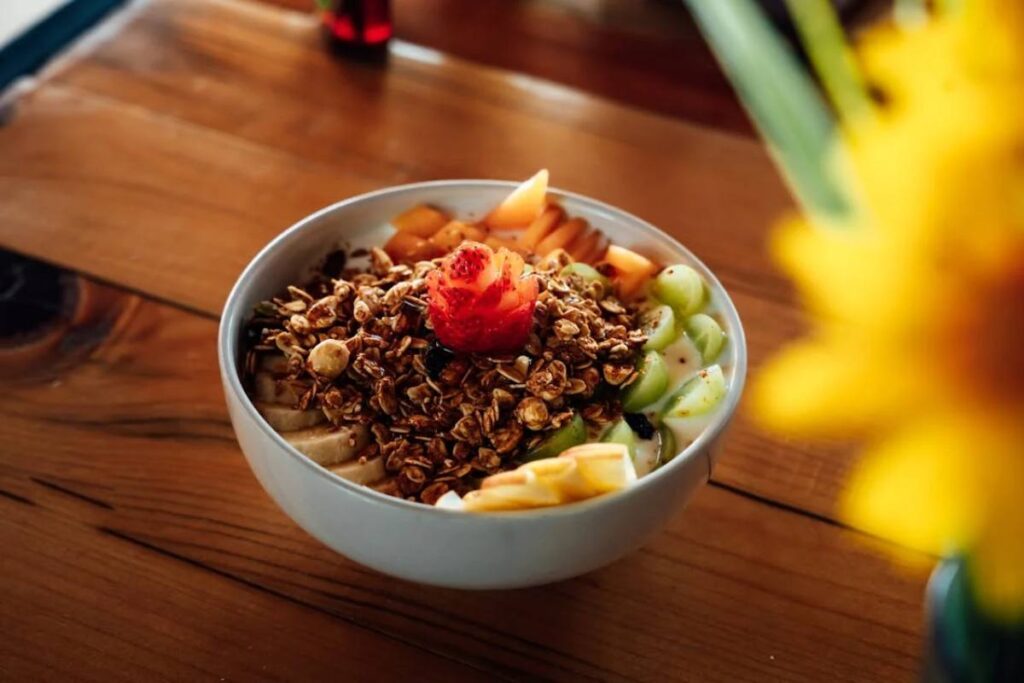At its basic level, nutrition is a regular, balanced diet. Good helps nourish the body what is nutrition. The foods we eat provide the nutrients the body needs to maintain the brain, muscles, bones, nerves, skin, circulation, and immune system. Eating well also helps protect us from diseases like heart disease, diabetes, cancer, and osteoporosis.
There are two main classes of nutrients in foods: macronutrients and micronutrients. Macronutrients are carbohydrates, proteins, and fats. They provide energy (calories) and serve as the building blocks of muscle and tissue.
In comparison, micronutrients are separate vitamins and minerals. They are divided into four types: water-soluble vitamins, fat-soluble vitamins, trace minerals, and micronutrients.
What Foods are Healthy?

For optimal health, science recommends following a plant-based diet, such as the Mediterranean-DASH (Dietary Approaches to Stop Hypertension) diet and the MIND (Mediterranean Dietary Intervention for Neurodegenerative Delay) diet. Plant-based diets have been shown to provide a variety of health benefits and are associated with a lower danger of heart disease, cancer, and other chronic diseases.
You can make various healthy recipes with so many food options on a plant-based diet.
While most plant-based foods provide significant health benefits, a few stand out from the rest. These “superfoods” give the most nutritional value. People should try eating some of these healthy foods daily or as often as possible. These include the following:
Berries. Berries are high in fibre and naturally sweet, and their rich colour means they are loaded with antioxidants and disease-fighting nutrients. Oily fish. Oily fish can be a reasonable basis of protein and omega-3 fatty acids, which help avert heart disease. Salmon, mackerel, trout, anchovies, and sardines have the highest omega-3 content.
Leafy greens. Dark leafy greens are a sound basis for vitamins A, C, and calcium, as healthy as certain phytochemicals (plant chemicals) that fight inflammation and protect cells from damage.
Dried fruits. Hazelnuts, walnuts, almonds, and pecans are good vegetable protein sources. They also cover monounsaturated fats, which may be a factor in plummeting the risk of heart disease.
Olive oil. Olive oil is a sound basis of vitamin E, polyphenols, and monounsaturated greasy acids, which help decrease the risk of heart disease.
Whole grains. Whole grains are a good soluble and insoluble fibre source and contain numerous B vitamins and reserves. They have been shown to lower cholesterol and defend against heart disease and diabetes.
Yoghurt. A reasonable basis of calcium and protein, yoghurt contains live cultures called probiotics. These “good bacteria” can defend the body from other harmful bacteria.
Cruciferous vegetables. These comprise broccoli, Brussels sprouts, cabbage, cauliflower, collard greeneries, kale, kohlrabi, mustard greens, radishes, and turnips. They are an outstanding source of fibre, vitamins, and phytochemicals that may help prevent certain cancers.
Legumes. This broad category includes red, black, and navy beans, chickpeas, soybeans, and peas. Legumes are an outstanding source of fibre, folate, and protein. Research shows they may help reduce the risk of cardiovascular disease.
What does a typical healthy meal on a plant-based diet look like? An excellent graphic guide is the Harvard Healthy Eating Plate. It shows the proportions of nutritious foods you should be eating. In most cases, aim to fill your plate with vegetables and fruits, a neighbourhood with whole grains, and the remainder with lean protein.
Should you take daily vitamins?
“Dietary supplement” is a general term that includes separate vitamins such as A, B, C, D, E, and K, as well as reserves such as calcium; multivitamins (a product containing 10 or more vitamins, minerals, or both); and specialized formulas for seniors or gender that include different combinations of vitamins, minerals, and other compounds.
Should you take a daily supplement?
Although supplements are popular, there is limited evidence that they provide significant health benefits or help protect against disease. A stable diet with plenty of fruits and vegetables for the average healthy adult delivers all the necessary vitamins and minerals.
However, there are situations in which people may need a dietary supplement, such as those identified with a vitamin deficiency confirmed by a blood test, those who have trouble getting specific vitamins from food, or those who have a medical condition that requires additional vitamins or minerals.
For sample, strict vegans may not get sufficient vitamin B12, which is found chiefly in animal crops. Low levels of B12 and B6 can be caused by digestive illnesses such as Crohn’s disease, celiac disease, and ulcerative colitis, which make it difficult to absorb nutrients. Adults diagnosed with osteoporosis may need extra vitamin D and calcium outside of what they get from their regular diet. Additionally, lactose-bigoted people who avoid dairy crops may not get sufficient vitamin D and calcium.
Doctors have different opinions about dietary supplements. Some believe they are unnecessary. Others take the “it may help, but it won’t hurt” approach, filling in nutritional gaps in the diet. Research has shown that taking dietary supplements as directed usually does not cause serious problems.
If you want to try additions, talk to your doctor first. They can advise you and help you choose an appropriate over-the-counter brand. The FDA monitors health claims on dietary supplement labels but does not guarantee that a product contains the ingredients listed.
Nutrition for Older Adults

Eating rights have become even more important as men and women reach the age of 50. It helps maintain high energy levels and protects against many age-related diseases like heart disease, cancer, and diabetes.
But is there a perfect diet for men and women over 50?
There is no one way to eat for good health. While we all need carbohydrates, fats, and proteins, there is no “magic” ratio we should aim for as long as we avoid extremes. Recent research has shown that food quality is more important than whether it is low in fat, low in carbohydrates, or low in the middle.
While the details may vary from diet to diet, all healthy eating plans share four basic principles:
Plenty of Plants. Plant nutrients (vegetables, fruits, legumes, whole grains, nuts, and seeds) contain many vitamins and minerals. They also contain fibre and beneficial compounds called phytochemicals, natural plant substances that provide a range of health benefits, such as antioxidant, anti-inflammatory, and even anti-cancer properties.
Adequate Protein. Numerous studies show that it is essential to eat enough protein. Many protein sources exist, but plant proteins (beans, lentils, soy products, nuts, seeds) and fish provide the most significant health benefits.
Minimally Processed Foods. A diet rich in ultra-processed foods causes weight gain and harmful blood sugar and cholesterol changes. Processing foods often removes nutrients and adds extra fat, sugar, sodium, additives, and preservatives.
Limited amounts of saturated fat, added sugar, and sodium. The U.S. government’s Dietary Rules for Americans recommend limiting soaked fat to less than 10 per cent of daily calories. The same goes for additional sugars (sugars added throughout processing). As for sodium, keep it under 2,300 milligrams (mg) daily—the average American consumes too much, more than 3,400 mg daily.
What is Nutrition Meal prep ideas
Eating healthy doesn’t have to be complicated. With some preparation and planning, preparing nutritious meals for the week is easy. Meal prepping has many benefits: it helps you save time and money and allows you to control portions to help manage your weight. It also reduces the stress of making daily decisions about what to eat.
Here are some steps to meal prepping.
Gather meal ideas. Collect healthy formulas, save them in a folder, or copy the recipe links into an online spreadsheet. Think of specific meals or foods for different days of the week, such as meatless Mondays, whole grain Wednesdays, and roast Fridays.
Start small. Cook enough dinners for two or three nights a week, then get going.
Pick a day. Pick a specific day of the week to do the following:
Plan your menu (either for the week or a few days) and write down your shopping list.
- Get your groceries.
- Prep your meals.
- Some days may overlap, but separating these tasks can make meal planning more manageable.
Prep in order. On meal prep day, focus on the foods that take the longest to prepare first. If you prefer not to prep your proteins ahead of time, consider marinating poultry, fish, or even tofu the day you prep them so you can pop them in the oven or roast them later in the week.
Multitasking. While your produce is baking or simmering on the stove, chop up fresh vegetables and fruits or shower and dry salad greens for later in the week.
Make extra servings. If possible, make extra portions of recipes for the next day or two of meals or freeze them for the next week.
Storage. Label all prepared foods with the date so you know when to use them. Rotate foods so the oldest items or meals are at the front. Keep perishables like vegetables, herbs, and chopped fruits front and centre at eye level so you remember to use them. Freeze prepared foods in airtight containers.
Stock up. Try to stock your kitchen with the following items. This will ensure you always have all your meal prep supplies in case you need to whip up a healthy meal.
- For your refrigerator: fruits, vegetables, dark leafy greens, low-fat cheese, fresh salsa, plain yoghurt, eggs, chicken, low-fat milk, pesto, light mayo, hummus, and lemons.
- For your freezer: diverse frozen vegetables (without sauce), poultry, fish, and berries.
- For your pantry: brown rice, quinoa, oats, whole-grain tortillas, whole-wheat pasta, whole-grain bread, nuts and seeds, peanut butter, onions, sweet potatoes, garlic, canned beans (low sodium), canned fish (sardines, tuna, salmon), low-sodium bisque, canned tomatoes, low-sodium chicken and vegetable broth, tomato paste, olive oil, balsamic vinegar, mustard, herbs and spices.


